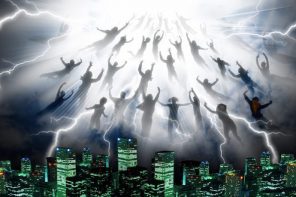I’ve been giving a lot of thought lately to the Second Coming. Don’t get me wrong, I’m not waiting for the Christian Airlift. As far as I can tell, the idea that some of us will be extracted at the last possible moment, leaving the rest to clean up after the party, is largely responsible for the fix we find ourselves in at present—with dying oceans, rising temperatures, and the projected loss of between one-quarter and one-half of all surface plant and animal species by century’s end. No. I’m not a rapturist. I’m not sure I’m even a Christian anymore. Still, I think it’s worthwhile asking what kind of teaching a “Second Jesus” might have for us today.
The first Jesus began his ministry with a sermon delivered from the exalted perspective of a mountaintop; a 360° view of man and nature that, compared with the temple-bound religion of his contemporaries, was a kind of teaching in itself. Today, when the Sermon on the Mount has long since left the summit for the sermon pulpit, we are apt to forget what Jesus and his disciples would have understood implicitly: that location is everything. A sermon like that, which teaches us to love our enemies and treat our neighbors as ourselves, just doesn’t make sense under any roof but the sky.
But now so much has changed. The world is bigger and more inclusive than in the days of desert and tribe. Climb the highest peak and you still can’t see enough of it. And so when I ask myself what kind of elevated vantage point a Second Jesus might find for his teaching today, really only one answer applies. His sermon would have to be delivered on the moon. Where else could he find a big enough perspective on global issues and problems? Where else could he offer the kind of post-tribal, environmental message that, going forward, must form the basis of any religion that wants to be part of the solution, not part of the problem?
I’m speaking figuratively, of course. Forty years after the first moon landing, it’s hard to imagine NASA finding the funds to take a rabbi (or anyone else for that matter) along for the ride. Nevertheless, it would be easy for a skilled preacher like Jesus to evoke that expansive perspective in people’s minds. Perhaps he’d powerpoint a shot of the famous photograph of the earth taken by Apollo astronauts—the one often credited with inspiring the worldwide environmental movement.
In the Sermon on the Moon, “consider the lilies” would become “consider the planetary ecosystem.” The “narrow way that leads to life” would become the “path of reduced consumption.” And a “house built upon sand” would be… well, just about any house built on any shoreline in the world, whether it was built on a rock or not. Sadly, the last line of the sermon wouldn’t require any updating at all: “And the rain descended, and the floods came, and the winds blew, and beat upon that house: and great was the fall of it.” In that one case, even I am willing to take the Bible literally: the seas are on the rise. All this may seem a little far-fetched to the faithful. Most Christians believe that Jesus wrapped up his teaching career the first time around. When he comes back it’s to oversee the Apocalypse, at which point, almost by definition, it’s too late for spiritual teaching and giving a sermon no longer has much use.
Which begs an obvious question: Does Christianity have any workable teachings for an age of global issues and concerns? I don’t believe that we are living in the End Times foretold in the Bible. All the same, I can’t deny that we have run up against some kind of wall as a species. It now seems likely that some great reckoning—if not moral, then at least environmental—is close at hand, and if that is true, I don’t want to hear from the Second Jesus if he has only come to judge. On the other hand, if he’s ready to preach the Sermon on the Moon, I’m all ears.
I don’t have much hope for the “new earth” foretold at the end of Revelation, but I’m more than ready for a teaching (from Jesus, the church, or anyone else who wants to offer it) that gives me a clear picture of the one I’ve got, and offers constructive ideas about how to go on living on it. Among other things, I’m ready for a teaching on global population that doesn’t use abortion or birth control as an excuse for denying the obvious: that our species has now outgrown its box. I’m tired of pontiffs and priests and religious pundits who publicly strain gnats out of their drinking water, but privately think nothing of swallowing a camel down whole. The good news is, if Jesus is coming to preach the Sermon on the Moon, they may all be out of a job. Because from the moon you can see clearly what we’re doing to the planet, but you can’t see dogmas, catechisms, or creeds.



